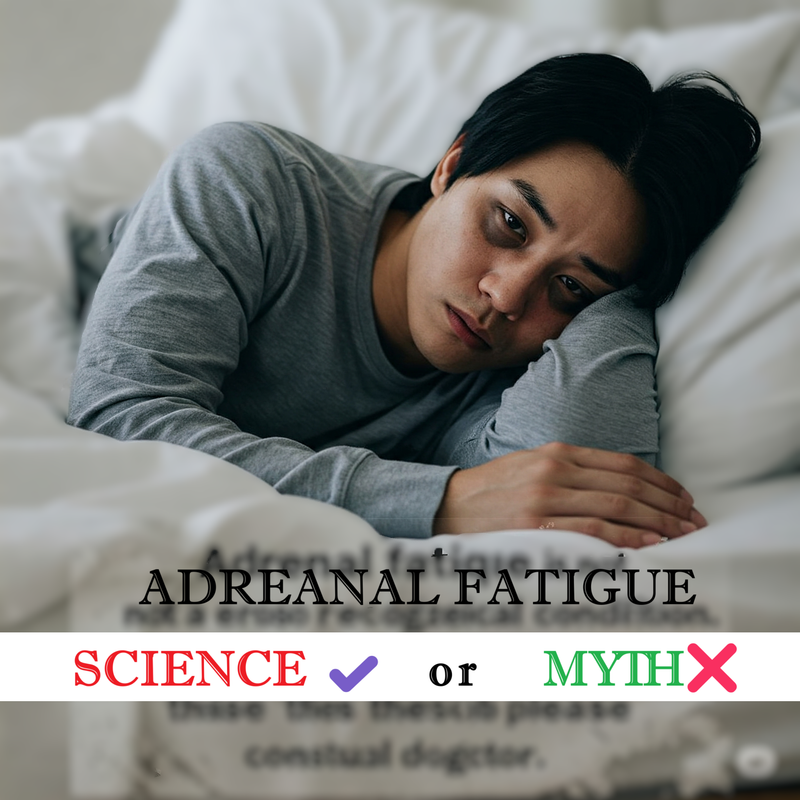"Adrenal fatigue" is a term frequently mentioned in discussions about chronic tiredness. The concept suggests that prolonged stress overworks the adrenal glands—small organs located above the kidneys—resulting in their diminished ability to produce key hormones, particularly cortisol. Popular within alternative medicine and among individuals seeking explanations for persistent fatigue, adrenal fatigue remains controversial and unrecognized by mainstream medical organizations.
Even though it's commonly discussed, this concept isn't supported by scientific evidence. Major health authorities have not identified it as a legitimate medical diagnosis. However, its popularity underscores a broader issue: conventional medicine may not fully address the complex and often frustrating symptoms of chronic fatigue. This article aims to explore the science behind adrenal fatigue and provide a balanced look at both perspectives.
Medical Perspective
Leading medical and endocrine institutions such as the Endocrine Society and the Mayo Clinic do not recognize adrenal fatigue as a real medical condition. Research reviews have found no scientific evidence supporting its existence. A notable review published in BMC Endocrine Disorders concluded that adrenal fatigue has no scientific foundation.
Medical professionals caution against embracing vague diagnoses like adrenal fatigue, as they may delay the detection and treatment of actual health conditions. Dr. Ann Kearns from Mayo Clinic emphasizes that mislabeling symptoms under this term can lead to long-term health risks due to overlooked or mismanaged medical issues.
Causes and Risk Factors
Supporters of adrenal fatigue theory believe that constant mental, emotional, or physical stress taxes the adrenal glands to the point of dysfunction, leading to reduced hormone production. Some even liken it to a mild form of adrenal insufficiency.
However, this theory conflicts with scientific understanding. Under stress, adrenal glands typically increase their production of cortisol—not decrease it. According to Dr. Anat Ben-Shlomo from Cedars-Sinai, stress normally stimulates hormone production unless there is an actual adrenal disorder.
This basic inconsistency is a primary factor in why mainstream medicine does not accept the adrenal fatigue theory.
Common Symptoms
People who believe in adrenal fatigue often report symptoms such as:
Persistent tiredness, especially in the morning
Difficulty waking and falling asleep
Cravings for salty and sugary foods
Dependence on caffeine
Muscle aches, body pains, and weakness
Appetite changes, weight fluctuations
Nausea, vomiting, low libido
Anxiety, depression, brain fog
Dizziness, lightheadedness, low blood pressure
Increased infections due to a "weakened immune system"
These symptoms are nonspecific and can occur in many medical conditions—or even due to lifestyle factors—making adrenal fatigue difficult to classify as a distinct clinical entity.
Diagnosis Challenges
A significant obstacle in legitimizing adrenal fatigue is the lack of specific, scientifically accepted diagnostic tests. Routine blood tests for adrenal hormones like cortisol usually return normal results, even in symptomatic individuals.
Alternative health practitioners may use blood or saliva tests to assess cortisol levels, but these tests are not supported by scientific research or endorsed by major medical organizations. As a result, diagnosing adrenal fatigue often relies on self-reported symptoms without clear clinical markers—posing risks of misdiagnosis and inappropriate treatment.
Treatment Options
Common treatment suggestions include:
Reducing sugar, caffeine, and processed foods
Taking supplements like B vitamins, vitamin C, magnesium
Using herbal remedies
Practicing stress-reduction techniques such as yoga or meditation
While healthier diets and stress management are beneficial, supplements marketed specifically for adrenal health often lack scientific validation. These products can be costly, ineffective, and even harmful due to poor regulation.
Taking hormone supplements like cortisol without a verified diagnosis of adrenal insufficiency is dangerous. It can suppress the body’s natural hormone production, leading to serious health complications. The Endocrine Society strongly advises against hormone supplementation unless medically necessary.
Prevention and Management Tips
Even without scientific support for adrenal fatigue, individuals experiencing chronic tiredness can benefit from evidence-based lifestyle changes:
Rest: Take a proper nap of 7- 9 hours
Nutrition: Eat a balanced diet rich in whole foods while limiting sugar and processed items
Exercise: Engage in regular aerobic and strength-training activities.
Stress Management: Practice mindfulness, deep breathing, yoga, or spend time in nature
Hydration & Habits: Stay hydrated, avoid excessive alcohol or nicotine, and maintain social support networks
When to See a Doctor
Persistent fatigue should prompt a medical evaluation. Symptoms caused by adrenal fatigue:
Adrenal Insufficiency (Addison’s Disease): A real medical disorder where adrenal glands do not produce enough cortisol or aldosterone. Symptoms include extreme fatigue, low blood pressure, salt cravings, and skin darkening.
Other Conditions: Hypothyroidism, depression, anxiety, sleep apnea, chronic fatigue syndrome, iron deficiency, and Cushing’s syndrome.
Unlike adrenal fatigue, these conditions have established diagnostic tests and treatments. Accurate diagnosis is essential to prevent delays in care and ensure appropriate medical intervention.
Conclusion
The concept of adrenal fatigue is well known for everyone but does lack the consent of science and medicine. Individuals facing chronic fatigue should focus on validated health practices and seek professional guidance to uncover and manage underlying conditions. Healthy lifestyle habits can improve well-being, but unproven supplements and therapies should be approached with caution.
Disclaimer
This article offers general information and should not be considered a substitute for professional medical advice.

Comments
Post a Comment